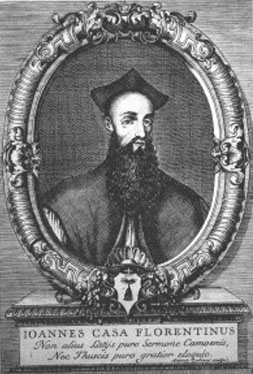<Back to Index>
- Surgeon Alexis Carrel, 1873
- Poet Giovanni della Casa, 1503
- King of England Henry VIII, 1491
PAGE SPONSOR



Giovanni della Casa (28 June 1503 – 14 November 1556) was an Italian poet and cleric.
He was born at Florence, in Tuscany. He studied at Bologna, Padua, Florence and Rome, and by his learning attracted the patronage of Alexander Farnese, who, as Pope Paul III, made him archbishop of Benevento and later nuncio to Venice, where he fathered an illegitimate child. After the death of his papal patron, he resigned curial office and withdrew to Venice and to the nearby Abbey of Nervesa, where he sought to emulate Petrarch and Boccaccio in a literary career. It was believed that his openly licentious poem, Capitoli del forno, his estrangement from the Medici regime in Florence, and the fact that the French court seemed to desire his elevation, prevented him from being raised to the cardinal purple for which he longed. He died in 1556, still Monsignor della Casa, and is buried in the church of Sant' Andrea della Valle in Rome.
Casa is chiefly remarkable as the leader of a reaction in lyric poetry against the universal imitation of Petrarch, and as the originator of a style, which, if less soft and elegant, was more nervous and majestic than that which it replaced.
His prose writings gained great reputation in their own day, and long afterwards, but are disfigured by apparent straining after effect, and by frequent puerility and circumlocution. The principal are in Italian, the famous Il Galateo (1558), a treatise of manners, which has been translated into several languages. His Latina Monumenta were edited by Piero Vettori and published by Giunta in Florence (1564). Vettori gave pride of place to a Carminum Liber, which makes artful use of classical models, includin Horace, Catullus, Virgil, Euripides, and Propertius; Vettori also included Life of Caspar Contarini, De officiis, and translations from Thucydides, Plato and Aristotle. Casa's Il Galateo was translated into 'Anglo - Latin' by Nicholas Fitzherbert under the title Ioannis Casae Galathaeus sive de moribus liber Italicus and first published at Rome in 1595. He is also credited as the first person to use the phrase "ragion di Stato", or "reason of state," in his Oration to Carlo V in 1549.
A complete edition of his works was published at Florence in 1707, to which is prefixed a life by Casotti.